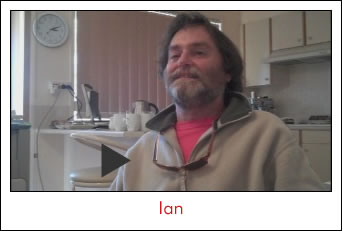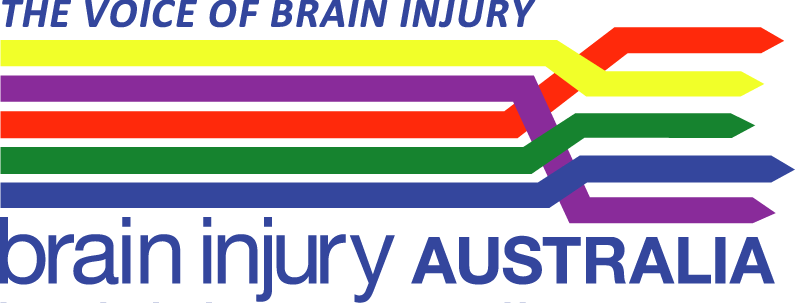- MODULE 1: Introduction to ABI
- Module Introduction
- Take the Pre-test
- a) A person’s abilities & life span
- b) What is ABI?
- c) Causes of ABI
- d) Incidence
- e) The brain
- f) Severity of ABI
- g) Cause to impact
- h) Rehabilitation
- i) Rehabilitation stages & pathways
- j) Common effects
- k) Impacts on life
- l) People with ABI
- m) Family and friends
- n) Key messages and
Tools to explore in Module 2 - o) Building skills
- Take the Post-test
j) Common effects 
- i)
Intro - ii) Ian
Video Q - iii)
Cognitive - iv) Commun-
ication - v)
Physical - vi) Emotional
/ behaviour - vii)
Challenges
i) Introduction
Common effects of Acquired Brain Injury are:
- Cognitive
- Communication/language
- Physical/sensory
- Emotional/behavioural/personality
There is overlap and interconnections between these effects.
The specific effects will be unique to each individual and their injury.
The extent of the effects and challenges for the person with brain injury depends on:
- The severity of the ABI
- The location of the brain damage in ABI
- The length of time since brain injury
- The extent a person has been able to integrate back into the community
- The support available to the person.
ii) Ian has an ABI (9.5 mins)
Ian has an ABI
Answer the following questions
What are the effects and consequences of Ian's ABI?
iii) Cognitive changes and difficulties
Thinking difficulties are common after an ABI.
Thinking difficulties can have a big impact on everyday life.
Some common thinking difficulties are:
- slower thinking processes
- reduced flexibility in thinking
- memory difficulties
- difficulties learning new information
- attention and concentration problems
- poor planning and organisational skills - executive ability
- poor reasoning and judgement
- difficulties in recognizing objects (changes in vision perception).
Based on material from: Brain Injury Association of NSW - www.biansw.org.au
iv) Communication/language changes and difficulties
The brain controls speech and language. If the parts of the brain responsible for speech and language are damaged there can be difficulties with communication.
The difficulties will depend on the nature and extent of the damage to the brain.
Speech, language and communication difficulties can have a major impact on everyday life.
Some common speech language and communication difficulties are:
- difficulty understanding what is said to you
- difficulty finding the words you are looking for
- difficulty in moving and coordinating the muscles used for speaking.
In addition cognitive difficulties such as memory problems, information processing problems and control problems impact on language and communication.
There are three principal sources of communication difficulties arising from damage to the brain:
a) damage to the communication areas of the brain which may cause:
- Dysphasia: Word finding, sentence construction and comprehension difficulties
- Dysarthria: Muscle control difficulties
- Dyspraxia: Muscle co-ordination difficulties
- Nonverbal communication difficulties.
b) damage to the cognitive areas of the brain which may cause:
- Memory problems
- Information processing problems
- Planning problems
- Inflexible thought process
- Initiation problems
- Control problems.
c) damage to the brain's frontal lobe which may cause social communication deficits for example:
- difficulty following the social rules and conventions of communication.
(c) Copyright - See: Module 2: Communication - www.TBIStaffTraining.info
iv) Physical - sensory changes & difficulties
Our body functions are controlled by our brain.
After a severe ABI motor difficulties, swallowing difficulties, sensory deficits, loss of bladder and bowel control and epileptic seizures are common.
After a severe ABI there can be difficulties with movement.
Dizziness, headaches and fatigue also occur after both mild and severe ABI.
There are rehabilitation strategies to help with most of these symptoms.
Some common difficulties are:
- motor/movement problems e.g.
o muscle weakness (e.g. weakness on one side of the body, weakness in both legs)
o muscle spasticity (e.g. where limbs become stiffer and when you try and move them you can feel resistance and the person with the ABI can feel pain). - sensory problems e.g.
o loss of vision
o loss of smell
o loss of hearing or ringing in the ear (tinnitus). - dizziness and balance problems
- pain and headache
- fatigue
- bladder and bowel problems
- epileptic seizures.
Based on material from: Brain Injury Association of NSW - www.biansw.org.au
v) Emotional/behaviour/personality changes and difficulties
Changes in emotion and behaviour are common after an ABI.
The emotional and behaviour changes are often what families and friends find most difficult to deal with.
The emotional and behaviour changes are both:
- a consequence of the areas of the brain that have been damaged
- the process of dealing with having an ABI and the impact on your life and those around you.
Common emotional reactions to an ABI include:
- depression
- anxiety and fear
- anger
- frustration
- mood swings.
Common behaviour changes include:
- apathy or reduced motivation
- increased irritability
- aggressive behaviour (verbal and/or physical)
- socially inappropriate behaviour
- difficulties relating to others
- restlessness /agitation.
Changes in sexual functioning after an ABI are also common. Sexual functioning involves physical, emotional, social factors all of which can be affected by an acquired brain injury
Based on material from: Brain Injury Association of NSW - www.biansw.org.au
vii) Challenges and difficulties
These common effects of ABI create challenges for people with ABI.
Just as the specific effects will be unique to each individual and their injury, the specific challenges will also be unique to each individual and their injury.
Some common challenges and difficulties are:
- Having difficulty in paying attention
- Being easily confused and overwhelmed
- Having problems in learning new information
- Being slower in processing information
- Difficulty in being able to use their knowledge in new situations
- Experiencing difficulty in keeping up with conversations
- Having difficulty in starting activities
- Experiencing word-finding difficulties
- Having problems in producing or understanding language
- Having problems getting or staying organised
- Having problems in planning
- Fixed in thinking patterns
- Difficulty following the social rules and conventions of communication
- Loss of self-esteem and self-confidence
- Changes in personality, egocentric, outgoing/introverted
- Irritability and "short fuse" / increased anger outbursts (very common) / difficulties in emotional control
- "Before/now" comparisons
- Impaired social and personal coping skills
- Impulsivity
- Sexual disinhibition
- Lack of initiative & drive / apathy, low motivational states
- Adjustment issues-depression, anxiety
- Relationship changes
Based on material from: Brain Injury Association of NSW - www.biansw.org.au


